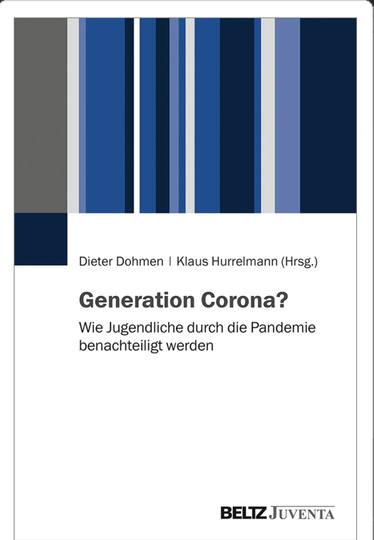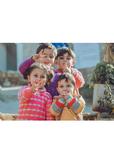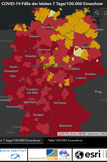Corona pandemic severely disadvantages children and young people - but there is no "Corona generation"
This is a core finding of the anthology "Generation Corona? How young people are disadvantaged by the pandemic", edited by Dieter Dohmen and Klaus Hurrelmann. It will be published by Beltz Juventa on 19 May 2021.
Across the 15 contributions, the picture is clear: children and young people are significantly affected by the pandemic. However, it mainly affects those who are also disadvantaged independently of the pandemic. The term "Generation Corona" is therefore misleading.

The Corona pandemic has left many children and young people severely disadvantaged. But who among them is particularly affected by the impact of closed or irregularly open daycare centers and schools, and who is or is not coping with home schooling, there has been no overview of this so far.
This is now changing: The volume "Generation Corona?", which will be published by Beltz Juventa on 19 May 2021, brings together for the first time all the studies that have existed on the subject to date. It comes to clear results, which are formulated very vividly and pointedly - always exemplarily underpinned by easy-to-understand tables. "The overarching finding is unambiguous," notes renowned education researcher Dr. Dieter Dohmen, one of the two editors. Dohmen, director of the lead FiBS Research Institute for Educational and Social Economics in Berlin, comes to a sobering conclusion: "Children and adolescents are all the more burdened and impaired, the more unfavourable their situation already was before the pandemic. If their living situation is cramped, their parents can't be home during the day and can hardly help, and the household has a poor technical infrastructure that may have to be shared with siblings - then the danger of losing touch is great." If the school is also poorly equipped digitally and the teachers lack the necessary digital literacy, then according to the available studies, the situation of the children comes to a head. Corona pandemic as a burning glass for social inequality "The Corona pandemic has dramatically worsened the situation of young people who were already socially disadvantaged," adds the second editor of the volume, Professor Klaus Hurrelmann, Senior Expert at FiBS. "Corona shows, as if through a burning glass, how great the inequality of educational opportunities is in Germany. Even before Corona, a fifth of children and young people fell through the cracks and did not find an apprenticeship place after school. Now, according to our forecast, it could be significantly more." The
The danger is very great that they will now completely lose touch and be threatened with unemployment.
Nevertheless, the two educational researchers do not think it is appropriate to put the label "Generation Corona" on the entire young generation. "Children and young people are considerably affected by the pandemic. However, the majority of them are coping reasonably well with all the adversities. It is mainly those who are disadvantaged even independently of the pandemic who get into big trouble," adds Dohmen.The demand: Think schools more holisticallyHe calls on politicians to develop a comprehensive, sustainable and ambitious concept. "It would be best if schools could be converted into structured all-day schools in the short term and act comprehensively in conjunction with extracurricular learning opportunities, professional tutoring, sports clubs and music schools. In addition, school social work should be increased and cooperate with extracurricular child and youth welfare services as well as with psychological support services. Studies also focus on learning development and the transition to training
The volume "Generation Corona? How young people are disadvantaged by the pandemic", edited by Dieter Dohmen and Klaus Hurrelmann, has been published by Beltz Juventa. In four sections, the volume evaluates studies on the effects of the pandemic on the learning development of children and adolescents as well as on the transition to education and mental health
The book: Dieter Dohmen and Klaus Hurrelmann (eds.):Generation Corona? How young people are disadvantaged by the pandemic302 pages, paperbackISBN: 978-3-7799-6546-6
Price: 24,95 (E-Book 22,99 Euro)
Among the authors are Yvonne Anders (Uni Bamberg), Stephan Huber (PH Zug), Alexandra Langmeyer (DJI), Kai Maaz (DIPF), Nele McElvany (IFS/TU Dortmund), Christina Anger, Wido Geis-Thöne, Axel Plünnecke (IW Köln), Ulrike Ravens-Sieberer (UKE Hamburg), C. Katharina Spieß, Mathias Huebener, (DIW), Ludger Wößmann, Larissa Zierow (Ifo Institute), Simon Schnetzer.
Further information is available on the Internet at
https://www.beltz.de/fachmedien/paedagogik/produkte/produkt_produktdetails/46515-generation_corona.
https://www.fibs.eu/referenzen/publikationen/publikation/kein-anschluss-trotz-abschluss-benachteiligte-jugendliche-am-uebergang-in-ausbildung/
Published on
Topics
Articles on the topic
-
How do I find a school place for my child?
Depending on the state and type of school, different things need to be...

-
Childcare - how does it work in Germany?
The path from application to daycare place is simple and complicated at...

-
Controversy: open schools or close schools?
Politicians should react now to slide unprepared into a forced closure....

-
Vocational orientation and career choice
A subcategory of "Training and studies"

-
Competences and school grades
A subcategory of "Training and studies"

-
Training or studying?
A subcategory of "Training and studies"
